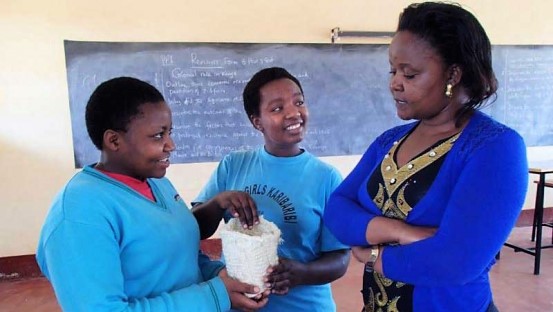Regina Mwihaki, 17 and Anne Njeri, 16 have developed a seedling bag made of sisal and banana stalk fibre. Seedlings are perceived as a symbol of nature’s ability to renew and provide.
Unfortunately, most times they come packaged in environmentally hazardous plastic bags. But two girls have a greener idea. Regina Mwihaki, 17 and Anne Njeri, 16 —students at Thika Girls’ Karibaribi—have developed a seedling bag made of sisal and banana stalk fibre. They get leaves of wild sisal plants, dry them, make ropes, then combine banana stalk fibre and weave the bags. “The bags are environmentally friendly and locally available. They are quite sturdy and portable,” Mwihaki says.
The young innovators have capitalized on the plastic ban effected in August by National Environment and Managment Authority. “The ban on plastics is a blessing in disguise. This is a simple and environmentally friendly alternative to plastics. This is a worthwhile venture for young people to engage in,” says Njeri. Weave hundreds of bags One of its strong points is the fact that the bag holds soil firmly. The bags cost between Sh150 to Sh200, which is affordable for many smallholder farmers.
The girls explain that one of the game changing benefits from this invention is that sisal produces a sap which is a termite repellant. In addition, the banana stalk fibre provides organic manure upon decomposition. The students came up with the invention, this year with the help of their equally innovative Agriculture teacher Diana Ndung’u. Teacher Ndung’u says the bag is a local solution to a local problem. “The project is part of our Young Farmers Project. It came in handy after the plastic ban by NEMA. We want to push the girls to weave hundreds of bags for the project. They will be used to plant vegetables,” she explains. In executing the plan, balancing classwork and weaving the bags has been a major challenge. To overcome this, they have roped in fellow students and the community to roll out the project. Teacher Ndung’u says the students are yet to commercialise the idea. “Though we have been getting inquiries from outsiders, for now we are only making them for the school agriculture project,” she says.
But she points out that the innovation has huge potential because it can revive sisal farming. Dr Richard Oduor, a Biochemistry scholar from Kenyatta University lauds the idea saying it is a potential game changer. “The sisal-banana fibre bag is a timely innovation. The beauty is that it is organic and will add nutrients,” he points out. He says unlike plastics that tend to clogs water pipes and chog the environment, the bags are biodegradable and aid in decomposition of raw materials for production of nutrients in the soil.
Dr Oduor believes the innovation will go a long way in ensuring plastic bags are eliminated from the environment. “We need to get more stakeholders to look at innovative ways to help the environment,” Dr Oduor says. The two teenagers root for the adoption of these bags because the process of making them is not capital intensive because the raw materials — banana and sisal — are easily available. The duo hope that the innovation will attract a serious investor who will commercialise the idea.








